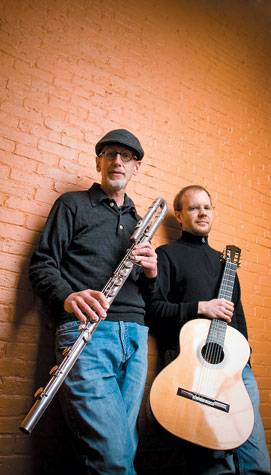
AT THE TOP OF THEIR GAME Carl Dimow and Nathan Kolosko. |
It can be easy to get wrapped up in Portland’s pop and rock scene, the singalong stuff you hear in the clubs and on the radio. It’s nice, though, to delve a bit deeper into the talent pool every once in a while and take a listen to stuff being made on the scene’s edges and fringes.
What a change of pace, this week, to immerse myself in the sophomore album from the Kolosko Dimow Duo, a jazzy, worldly, maybe even new-agey collection of instrumentals featuring Nathan Kolosko’s precise and exacting classical guitar and Carl Dimow’s florid flutes (which you’ve heard before, assuredly, in everything from the Casco Bay Tummlers to Okbari to the Orchard and lots of other guest spots). Transposed with the upbeat and blood-boiling works of the likes of the Sophomore Beat, Holy Boys Danger Club, or Arms Against a Sea, Kolosko and Dimow are a salve, a bath of notes and sentiment.
The 12-song Border Crossings is essentially in three pieces. A four-song collection penned by Kolosko, inspired by Steinbeck’s short novel The Pearl; a four-song “Klezmer Suite” by Dimow, taken from his experience with the Tummlers and the Klezmer tradition; and four interpretations of work by Baden Powell de Aquino, pronounced in places as the greatest-ever Brazilian guitarist, with dozens of recordings to his name, including a dozen released after his death at 63 in 2000.
Maybe unsurprisingly, the Powell works are the most accessible, filled with melodies and riffs you should find familiar, even if you can’t quite place them. The album opener, “Canto de Xango,” fires in with both players making their instruments percussive, as though heading off any thoughts you might have that this is going to be a light-weight affair, then settles into a folksy samba. At times here and on later Powell tunes Dimow’s bass flute rattles to the point where it sounds a little like a giant kazoo. It’s unlikely you’ve heard this instrument played this way.
“Canto do Ossanha” is my favorite of the Powell songs, painting a picture of a dark jazz club, with some slurred trills from Dimow and a cool switch that brings the guitar to the fore in the second half, arcing out a spry and pop melody for a few delicious measures. The song has a ton of personality.
Kolosko’s four songs, collected under the title “Nayarit,” for the Mexican state, carve out a narrative centered around Kino, Steinbeck’s protagonist, and in “Kino” we’re meant to live with him the varied emotions he experiences throughout the parable — despair, ecstasy, pride, fear, remorse, utter despondency. It’s the kind of song that might remind you of interpretive dance, where you can just about see the head of an oddly frocked dancer pop up, look about in exaggerated manner, and start gliding across the stage. I’m not sure if that’s a good thing or a bad thing. It’s an expressive song, but for my money it doesn’t go far enough. I don’t think the lows are low enough or the highs high enough. I was hoping for something manic, something crazed. It’s not quite there.
If you’re looking for a lullaby, though, you can’t do much better than Kolosko’s “Duerme.” It’s four minutes of restfulness made musical.
Dimow’s “Klezmer Suite” is a little more abstract, especially the opening “Tarras,” where Kolosko is quick and quiet, with hordes of rolling notes, while Dimow carves out a gypsy melody that moves so high in the register that the flute seems to actually strain at the effort, with distorted and fraying notes. It gets chaotic, almost mean; there are squalls of sound. “Dreams of Yesterday and Tomorrow” opens with a flute like a djembe, tribal in the way Dimow spits out a single high note at the finish of long lines. Kolosko does a wonderful job mid-song with a repeating bounce of five notes, then gets very staccato and boom-bip. Finally, the two snake in and out of one another, locking in for certain melodies, playing call-and-response at other times. It’s their best interplay on the album.
The other two tunes in the suite are more bouncy and summery, in the case of “Casco Bay Chusidl,” or just-plain familiar, as in “Oriental Hora,” where the two execute a tough speed-up throughout the six-minute song, but don’t quite let their hair down in the finish, keeping things decidedly on the rails.
If some of the playing is “safe,” however, the recording is anything but. The mics are so raw and close that you can often hear them taking breaths, even seeming to sigh with the effort of pulling off a particularly sweet piece of music. There’s nothing to hide behind here, and it’s clear they don’t need it anyway. Kolosko and Dimow are both excellent in their crafts, and original in what they do, and there’s a lot to listen for here.
Sam Pfeifle can be reached at sam_pfeifle@yahoo.com.
BORDER CROSSINGS | Released by Kolosko Dimow Duo | at Trinity Episcopal Church, in Portland | March 27 | carldimow.com | nathankolosko.com